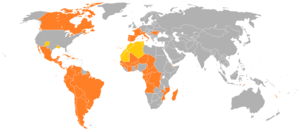The purpose of this site is to enable you/me/us to chat up – oops, sorry, chat with, watch your prepositions, Bernardo! – the 1030 million people who speak the major Romance languages. The orange and yellow bits on the accompanying map from Wikipedia will give you some idea where most of them are. There should be a tiny, tiny dot in eastern Australia, in Sydney, to indicate me – Wikipedia has left me off the map!
Mastering the verb “to be“, needless to say, is an important step along the way because once you have done that you can then go on to say things like “I am hungry, I am thirsty, I am horny” etc etc. In some Romance languages, though, they say “I have hunger” and “I have thirst”, which is why the verb “to have” is also so important. Whether they also say “I have horniness” at this stage I have no idea, but I guess sooner or later we will find out.
In the meantime, here is a recap of the verb “to be” in the five featured Romance languages. Some of these languages have two verbs meaning “to be”, and some have more than one way of saying “you” depending on whether it is a formal or informal relationship.
French (être):
singular: je suis; tu es; il, elle est;
plural: nous sommes; vous êtes; ils, elles sont
Portuguese (ser)
singular: eu sou; tu és; ele, ela, você é
plural: nós somos eles, elas, vocês são
Portuguese (estar)
singular: eu estou; tu estás; ele, ela, você está
plural: nós estamos; eles, elas, vocês estão
Spanish (ser)
singular: yo soy; tú eres; él, ella, usted es;
plural: nosotros -as somos; vosotros -as sois; ellos, ellas, ustedes son
Spanish (estar)
yo estoy; tú estás; él, ella, usted está;
nosotros -as estamos; vosotros -as estáis; ellos, ellas, ustedes están
Italian (essere)
singular: io sono; tu sei; Lei, lui, lei è
plural: noi siamo; voi siete; loro sono
Italian (stare, which can also mean “to stay”)
singular: io sto; tu stai; Lei, lui, lei sta;
plural: noi stiamo voi state; loro stanno
Romanian (a fi)
singular: eu sunt; tu eşti; el, ea este
plural: noi suntem voi sunteţi ei, ele sunt

